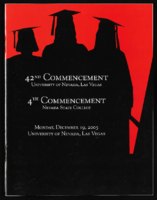Search the Special Collections and Archives Portal
Search Results
Tonopah and Tidewater Railroad Records
Identifier
Abstract
The Tonopah and Tidewater Railroad Records (1905-1977) contain correspondence, purchase requisitions, bills of lading, freight reports, and waybills. Also included are a ledger book, a rubber stamp, and a booklet, "Diagrams of Locomotives and Tenders." Incorporated in 1904, the Tonopah and Tidewater Railroad operated for 35 years, connecting Ludlow, California with Beatty, Nevada by way of Death Valley on the Santa Fe Railroad main line. The records are concentrated on the later years of the railroad from 1930 to 1940.
Archival Collection
Frank Williams Papers on Early Nevada
Identifier
Abstract
The Frank Williams Papers on Early Nevada (1892-1946) consists of manuscripts written for the most part by Frank Williams, an early resident of Southern Nevada. The collection includes Williams' autobiography as well as histories of Goodsprings, Potosi Mine, Mesquite Valley, and the Yellow Pine Mining districts. Finally, this collection contains reports and material reflecting Frank Williams' two terms as University Regent (1909-1912 and 1923-1942) at the University of Nevada, Reno, and his four terms in the Nevada State Assembly.
Archival Collection
Marge Jacques Papers
Identifier
Abstract
The Marge Jacques Papers (1960-1990) comprise the personal papers of Marge Jacques, a prominent member of the Las Vegas, Nevada gay and lesbian community, and owner of the gay bar, Le Cafe. The papers contain correspondence, licensing records, financial statements, and artifacts from clubs that Jacques owned or managed. Also included are photographs, videotapes, audiotapes, newspaper clippings, and Gipsy Nightclub promotional material.
Archival Collection
Joseph "Wingy" Manone Papers
Identifier
Abstract
The Joseph "Wingy" Manone Papers (1934-1996) include a partial draft of his autobiography, newspaper clippings, correspondence, magazine articles, and press releases related to his musical career. Manone also wrote music, some of which is included in the collection.
Archival Collection
Bob Parker Photograph Collection
Identifier
Abstract
The Bob Parker Photograph Collection consists of twenty-seven black-and-white photographic prints showcasing the construction of the Hoover Dam (Boulder Dam) from approximately 1930 to 1942.
Archival Collection

Transcript of interview with Lois Cox by Mitch Cox, March 18, 1978
Date
Archival Collection
Description
On March 18, 1978, Mitch Cox interviewed Lois Cox (born 1938 in Ely, Nevada) about her experiences growing up in and living in Nevada. Cox first talks about her family background and then discusses her educational and employment backgrounds. She then describes her work for the Clark County School District, the changes in schools over time, and her opinions on how student activities have changed. The topics then shift to Cox’s opinions on some of Nevada’s politicians, her Basque background, and the changes in Las Vegas over time, particularly those related to gambling.
Text

Transcript of interview with Guy Hamblin by Barry Merrell, February 22, 1975
Date
Archival Collection
Description
On February 22, 1975, Barry Merrell interviewed former railroad worker Guy Hamblin (born 1896 in Clover Valley, Nevada) in his home at 4306 Kay Place, Las Vegas, Nevada about the history of Southern Nevada. Specifically, the two discuss Hamblin moving from different towns in Nevada before settling down in Southern Nevada, viewing the above-ground atomic bomb tests, early Fremont Street, and his work on the railroad. In addition, Hamblin also discusses the demographic and economic changes that he has seen in Las Vegas.
Text

Jean Munson oral history interview: transcript
Date
Archival Collection
Description
Oral history interview with Jean Munson conducted by Vanessa Concepcion, Cecilia Winchell, and Stefani Evans on November 30, 2021 for Reflections: The Las Vegas Asian American and Pacific Islander Oral History Project. Jean discusses her childhood growing up in Guam, the nursing career path of her parents, and her decision to pursue an "unconventional path" as a comic book artist. She talks about her education at the University of Nevada, Las Vegas, her passion for the Asian American Pacific Islander (AAPI) community within Las Vegas, and her roles in community activism and leadership. Jean also shares her current pursuits as a podcaster of Bruha Baddies, co-owner and printer of Plot Twist Publishing, and co-founder of the Comic and Zines Festival.
Text

University of Nevada, Las Vegas (UNLV) 42nd commencement, Nevada State College 4th commencement program
Date
Archival Collection
Description
Commencement program from University of Nevada, Las Vegas Commencement Programs and Graduation Lists (UA-00115).
Text

Olivia Díaz oral history interview: transcripts
Date
Archival Collection
Description
Oral history interviews with Olivia Díaz conducted by Nathalie Martinez and Barbara Tabach on August 31 and September 14, 2020 for the Latinx Voices of Southern Nevada Oral History Project. In the first interview, Díaz gives her family and personal history, growing up in Las Vegas but often visiting her family in Durango, Mexico for extended stays. She recalls her matriarchal upbringing, particularly while living in Mexico, and what life was like growing up and going to school in East Las Vegas and at the University of Nevada Las Vegas (UNLV). Subjects discussed include: Mexico; Latina identity. In the second interview, Díaz talks about her English language education career for the Clark County School District (CCSD) and the events that led her to run for Nevada Assembly and Las Vegas City Council. She is presently Nevada's Assemblywoman for District 11 and Las Vegas' Councilwoman for Ward 3. Olivia concludes her interview with insights into her political and educational goals for the community and the initiatives she has focused on in light of the COVID-19 pandemic.
Text
